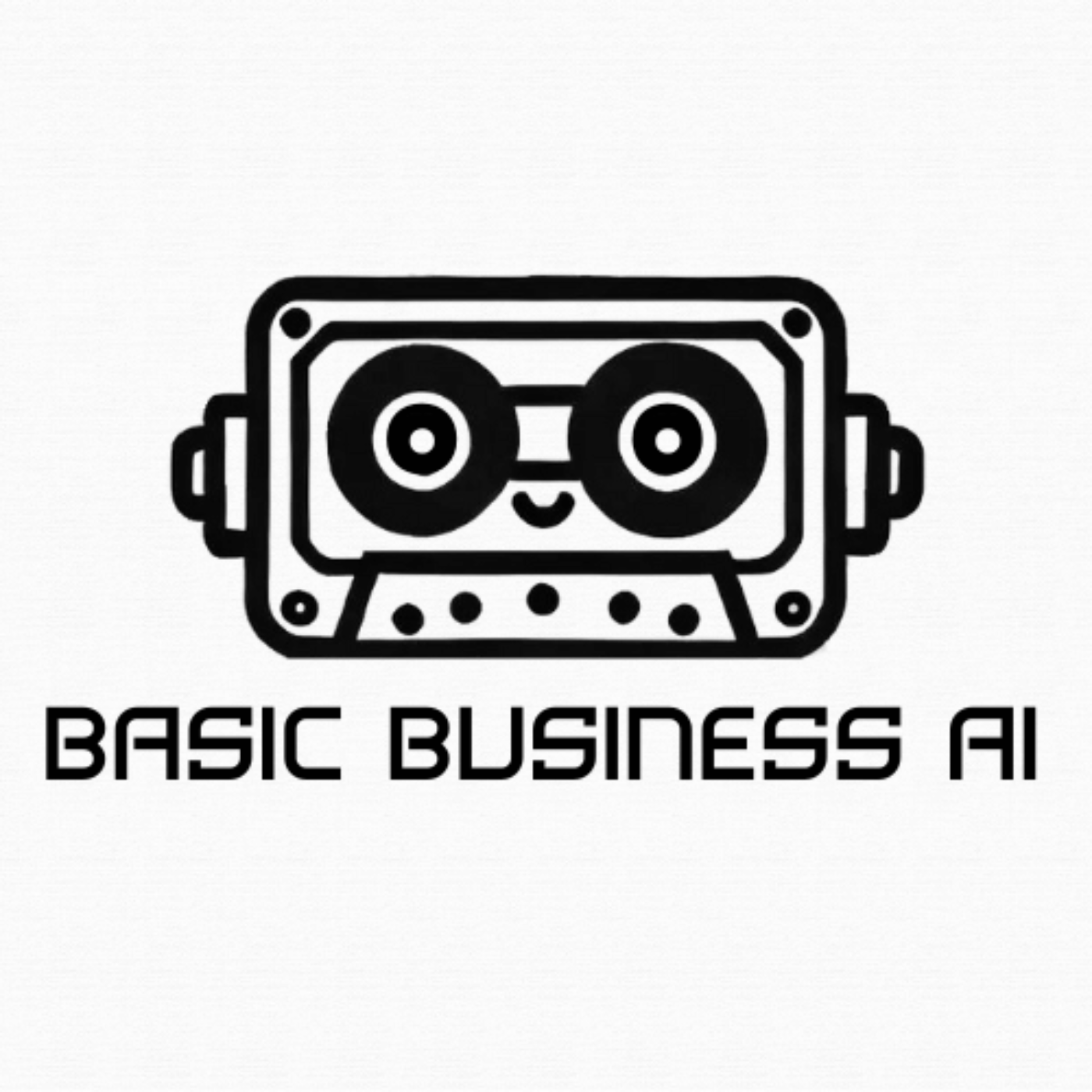Episode Transcript
[00:00:00] Speaker A: Welcome to Basic Business AI, a podcast dedicated to simple AI strategies for businesses who don't want to get an advanced tech degree or hire some marketing bro. I'm your host, Josh Thomas. You can find me on all social media at JT. Literally, we bring on regular business owners just like you, just like me, to discuss practical strategies, ideas, and perspectives about AI without getting too far into the weeds of the tech Bb. AI is sponsored by Anabots. Did you know companies that respond to customer inquiries in less than 1 minute have a 400% higher chance of closing the deal? Our AI powered assistants have an average response time of just 9 seconds, meaning you can close more sales without generating more leads. No tech skills are needed, and you can get started in less than five minutes. You can go to Anabots AI to learn more. That's Anabots AI. Today's guest is Tobin Brogne. Tobin is a leading authority on the impact of technology on main street businesses across America. Virtual storefronts gives local shops the benefit of a website without the hassle of hosting a website. Totally welcome to basic business AI. From your perspective, how is AI reshaping the future of your industry?
[00:01:19] Speaker B: That's a great question.
Generally speaking, what we're doing is we're helping local businesses show up in local. Well, first of all, thanks for having me, Josh. It's going to be a fun time. So we're helping local businesses show up in local search results, which are dominated. Local search results are dominated on popular platforms like Google by major big box like Walmart and e commerce. So the problem is local businesses don't have a lot of web presence. Two out of three of them in rural America don't have a website. So when people are doing local searches, they aren't getting information about local businesses, which is a huge problem. So we document those local businesses by creating a set of keywords, and then we feed that data to Google. So one of the huge issues and one of the game changers coming online for, like, what's going to happen with AI over the next ten years with Google Search is that Google, let's just take a for instance. It's approximate. There's about maybe 20% of the content right now online is generated by computers. It's not authentic human data because AI generated that content. So you have, like, a percentage of content online that Google needs to parse through and figure out what is authentic and what's not authentic in order to give people who search authentic results. So Google already had the problem of having SEO optimized like they have. The problem right now, where Walmart has millions of dollars. So that Walmart is the local search result here in western North Carolina, where I am, when you're searching for a tent, not the local sportswear shop, that doesn't have millions of dollars to show up in local search results in Cherokee County, North Carolina. So already, like, Google has this issue of, like, authenticity, right? Like, what is a real. What is there even getting local results?
[00:03:21] Speaker A: Yeah. Pay to pay to play, pretty much even. Even with SEO sometimes.
[00:03:25] Speaker B: Oh, well, Google's given local businesses a ridiculous job, right? So Google says, just build yourself a website and then your website can compete with Walmart's website, no problem. Like, in local search. And that's ridiculous. It's a ridiculous job because in order to build a website that's truly competitive with someone, with a company that has millions of dollars at their disposal and an entire army of white collar workers to game the engineers that just walked right out of Google into the job at Walmart, it's not a fair fight. There's nothing that you can really do. So we're engineering technology that allows those businesses to get into the fight because we're like the main street, you know, mom and pop don't have a technology department.
They have, like, three people working there or five people working there. And so they don't have divisions of labor or anything like that.
[00:04:21] Speaker A: Yeah. Right. And that's really the thing. Mom and pop, you know, we affectionately, I'd love to meet the actual mom and pop. You know, like, we talk about them so much. It's like, oh, they're family, you know, but mom and Pop are focused on running their store. Mom and Pop are focused on unclogging people's pipes, fixing people's air conditioners, helping people file their taxes. That's what they're focused on. That's what they're good at. They don't want to become marketing engineers or experts. And to a certain extent, with AI, if they're listening to this podcast, you're curious about AI and you want to learn about it and you want to leverage it, and you're a little bit intimidated or afraid, probably, but you don't necessarily want to become an expert. And so what have you seen, Tobin, has shifted in your industry because you're right. You're, like, elbow deep in the middle of all this stuff.
[00:05:16] Speaker B: So an interesting trend that you're talking about, which is people don't get, as I like to say, people don't get into a local business in order to work behind a computer screen, a lot of them are actually retired from Atlanta and they move up here and then they have a completely separate career, you know, after they've retired from a job where they are behind a computer screen, they don't. So people don't get mains, don't open Main street businesses to spend more time. They want more interactions. So what we need, the issue that we're seeing is that people are going to voluntarily opt out of that, even if it's a hit on their marketing. So they just remain undocumented because they aren't going to build a website, because they don't trust the guy who's going to rip them off on it. They don't have the right relationship. They don't have. They aren't tech people, just like you are saying. And so they won't solve that problem because the problem hasn't, like, the solution to that problem hasn't been presented to them. And the person that gave them or the entity that gave them that problem, aka Google, has not presented an easy solution for them. So that's where we come in, as.
[00:06:21] Speaker A: We step in, and I want to separate one thing that you said there that's really important is, you know, most people aren't tech people. And first of all, that's okay. Like, there's nothing wrong with that. I want to, I want to clarify. There's nothing wrong with the fact that you opened up a store or a business or a service and you just want to do that. No, no problem there. There are solutions. You gotta, you can't ignore, you can't turn your back on technology, but you don't necessarily have to go and get yourself into the weeds of that. And that's really where a business like Tobin comes in. So tell me a little bit more about that.
[00:06:57] Speaker B: So that's exactly right.
There's this expectation because we're still early in the technological age.
These big companies have a very myopic view of their technology. They're like, I put this thing out to make it possible to be found. So Google assumes that the local business owner is going to do the work 20 years down the road. They haven't solved that problem. We have this persistent hangover problem, which is that technology companies haven't really figured out how to make technology, like no effort whatsoever for the people that are using it, because they don't think like the people that make it. They think like people that make technology. And that's exactly who. That's a huge. There's this old video of Steve Jobs where he explains before even personal computers were common. He said. Personal computers are going to have to be more powerful than all of the stuff that we did before, and they're going to have to have more resources used in order to make it user friendly. It takes more effort to make technology that works for people without them having to do the work. One of our taglines is technology without the work. If you go to technologywithoutthework.com comma, it'll take you to virtual storefronts co. Our sales page, because we literally, we've been doing this pilot for almost three years now and we have to develop our product that's a perfect fit. And what we found is that people do not have the time for it or the patience for it. They're at the burnout phase. It's not like the gee whiz look what technology can do. Everyone's on their phone.
[00:08:28] Speaker A: I ain't got time for that.
It's just the same, it's the same deal, man. We're like, you know, I won't say that we're related, you know, but we're definitely looking in the same direction on this. Our AI company is very much like, hey, do you want to use AI? Great. I don't ever want you to touch a piece of code. I don't need you to know what an LLM stands for. All I need you to know is you want somebody that's going to answer the phone for you when you're knee deep in your other thing. AI can do that and we'll take care of the rest. That's the idea. Just go stay focused on what you do and get the person that you trust that you know is going to do a good job that you feel has got your best interest at heart. Let them do what they do best because they're probably terrible plumbers. I know I am.
[00:09:16] Speaker B: Yeah, I'm not a great plumber either. That's why we have these local experts and they're an untapped resource. And part of the reason is because technology hasn't done a good job of bridging the gap between technology and the people that are not tech savvy. That's the next wave of tech. There's two trends I see in tech. One is bridging the gap like you're doing with AI and like we're doing with websites where people simply do not have to do. To order what we have. You go to Virtualstorefronts Co. You make a purchase, yearly subscription purchase for a low price. And then you fill out a form for five minutes. We deliver it in seven days. So there's very, very little work involved. And that low work trend is going to be going into the future for sure. So that's like, the less.
I call them digital chores. And at the core of that, it's like unnecessary digital chores you're doing, because technology companies aren't doing their job of making technology accessible to people that are non technological. So we are the guys doing that job. The second trend that I definitely see happening is that technology that enables offline relationships is going to become a bigger and bigger market. If you look at Airbnb, that's technology that connects people in real life to real life experiences. People aren't using Airbnb when they're at their Airbnb. They're living life, and that is going to be technology. People don't wake up in the morning and say, oh, my God, I don't have enough screen time today. I need more. I mean, there are times you just miss faces.
[00:11:01] Speaker A: You work remotely. And I remember when we were sitting at home with COVID and, like, I hadn't seen a human for, like, two months, and I just, like, I just want to see a face, dude. Like, and we're designed for that. You know, we're drawn to it, and then we isolate ourselves with all of our technology. And that's probably one of the deepest things that I've heard on this podcast, is technology is going to be trending towards facilitating offline, analog, in person relationships. And it's almost like this, you know, the circle of life completes itself. Awesome.
[00:11:36] Speaker B: Well, it's. If you look at it in terms of a purely market standpoint, markets fulfill needs where there's scarcity, and the scarcity is what you just described. People do not have a lot of, you know, people have so much screen time. There's an abundance of that. Anyone can offer more screen time, but can anyone use technology to connect you to offline screen time? And what we have here with virtual storefronts is people frequently mistake us for e commerce. We're not e commerce. We're capturing online shoppers in search so that they can then go to the business in person and make a purchase there. And the fact of the matter is, you, yourself, and me, I'm in small town America. I am surrounded by people who are waiting for me to walk in and have a face to face experience. And when I buy a toaster there, like, it better work or I'm coming back. As opposed to Amazon, where I buy a toaster that has five star reviews and 10,000 of them, and it doesn't work right. So they're accountable to me.
They're local experts and they're an underutilized resource. So all we're really doing is doing what Airbnb does, which is connecting people to like real life resources that were otherwise not documented before and really just need to be documented.
The problem with Google is that Google knows the category of the businesses like the yellow pages, but Google doesn't know that much more about the business because Google says, well, in order for us to understand everything that you have, you need a website. So you have to build a website with 20 pages in this format. And it's going to change. The rules are going to change when we have our SEO press release in three months, et cetera, et cetera. That's the job they give these businesses, which is a really tough job. So we actually just document the business and feed those keywords to Google. And Google loves it because Google loves it because it just doesn't know anything about these businesses.
They're undocumented in Google. So we tell Google that they have jeans. So when you're searching for jeans, the local business comes up ahead of the e commerce and the Walmart. And that's just good for the shoppers. It's a deficiency for Google that they have all this clutter basically in local search results. That needs to be solved.
[00:14:00] Speaker A: Yeah. Awesome. So where can we go to learn more about this and get started?
[00:14:03] Speaker B: Sure. So the number one place to learn about it is virtualstorefronts Co. Just go to the co is what I say. That's our sales page and you can learn all about it. You can watch videos about it. You can see oodles of testimonials, video testimonials there. And then it takes five minutes to order. If you like it, it starts at 199 per year, including setup.
And you can, it's called a virtual storefront. It works anywhere in the country. We've tested it across the country. We're focused on our pilot. So here in our pilot we have 145 businesses. Those businesses are showing up approximately 2000 times a day or more in local search in a low search volume area. We started back in January of 2023, getting about 5500 per month.
So it's just like Google is very, very appreciative of what we're telling them.
[00:14:59] Speaker A: Excellent. I love that. So, hey, we're going to wrap up from here. Thanks so much to our guest, Tobin Broguenier, for coming on and sharing a practical conversation about AI technology and its potential for impacting your business in the long term. So you can learn more about what he does. Bye. Going to virtual storefronts Co. Just go to the CEO. As he says, if you run a business of any size and you have some ideas or strategies around the topic of AI, we'd love to have you on a future episode as well. We interview business owners of all levels of experience and exposure to AI so we can represent all voices, especially that 90% of us who are curious about AI but not trying to be tech geniuses. You can apply for a future episode, but you can follow sometimes, Tobin. It just doesn't come out right. Hey, you can apply for a future episode by going to basicbusinessai.com. and one more time, if you want to install a sales and support team for less than 10% of the cost of an employee, get yourself an anabot. You can learn more at anabots AI. We'll see you next time here on basic business AI. And by the way, if you liked this episode, please tell your friends. See you later.



